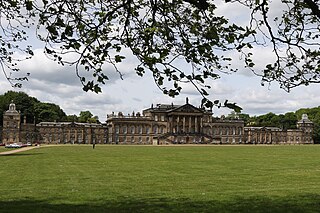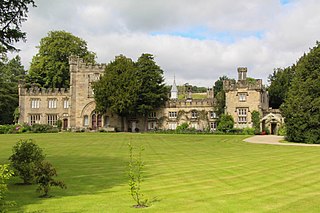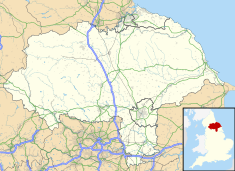
Wentworth Woodhouse is a Grade I listed country house in the village of Wentworth, in the Metropolitan Borough of Rotherham in South Yorkshire, England. It is currently owned by the Wentworth Woodhouse Preservation Trust. The building has more than 300 rooms, with 250,000 square feet (23,000 m2) of floorspace, including 124,600 square feet (11,580 m2) of living area, and was – until it ceased to be privately owned – often listed as the largest private residence in the United Kingdom. It covers an area of more than 2.5 acres (1.0 ha), and is surrounded by a 180-acre (73 ha) park, and an estate of 15,000 acres (6,100 ha).

Bretton Hall is a country house in West Bretton near Wakefield, West Yorkshire, England. It housed Bretton Hall College from 1949 until 2001 and was a campus of the University of Leeds (2001–2007). It is a Grade II* listed building.

Keld is a village in the English county of North Yorkshire. It is in Swaledale, and the Yorkshire Dales National Park. The name derives from the Viking word Kelda meaning a spring and the village was once called Appletre Kelde – the spring near the apple trees.

Grinton is a small village and civil parish in the Yorkshire Dales, North Yorkshire, England. Close to Reeth and Fremington, it lies 9 miles (15 km) west of Richmond on the B6270 road.

Florin Court is an Art Deco / Streamline Moderne Grade II residential building on the eastern side of Charterhouse Square in Smithfield, London.

Wilderhope Manor is a 16th-century manor house in the care of the National Trust. It is located on Wenlock Edge 7 miles (11 km) south west of Much Wenlock in Shropshire, England. The manor is a Grade I listed building and since 1937 has been used as a youth hostel.

The Youth Hostels Association is a charitable organisation, registered with the Charity Commission, providing youth hostel accommodation in England and Wales. It is a member of the Hostelling International federation.

Ribston Hall is a privately owned 17th-century country mansion situated on the banks of the River Nidd, at Great Ribston, near Knaresborough, North Yorkshire, England. It is a Grade II* listed building.

Whorlton Castle is a ruined medieval castle situated near the abandoned village of Whorlton in North Yorkshire, England. It was established in the early 12th century as a Norman motte-and-bailey associated with the nearby settlement. The castle is an unusual example of a motte-and-bailey that remained in use throughout the Middle Ages and into the early modern period.

Townhill Park House is a Grade II listed former manor house between the neighbouring housing estates of Townhill Park in Southampton and Chartwell Green in Eastleigh.

King's House is a Grade II listed building in Slaidburn, Lancashire, England, now used as a youth hostel. It was originally built in the 18th century, although parts of the building date back to the 17th century, as the Black Bull public house. The building remained an inn until 1932 when it was rented to YHA and has remained in use as a youth hostel since then. The official opening took place on 28 August 1932. The name King's House is derived from the King family who owned the village the 17th century and whose descendants, the King-Wilkinson family, still own most of the properties in the village.
John Charlesworth Dodgson Charlesworth was a British colliery owner and Member of Parliament for Wakefield between 1857 and 1859. Defeated by his Liberal opponent, William Henry Leatham at the 1859 general election both he and Leatham were subsequently found to have conducted extensive bribery during the campaign.

Forcett Hall is an English country house in the village of Forcett, North Yorkshire, England, some 6.5 miles (10 km) west of Darlington. It is a Grade I listed building.
Hemingford House is a 19th-century house in Alveston near Stratford on Avon in Warwickshire, England. It is a Grade II listed building.

Stone Gappe is an 18th-century house in Lothersdale, North Yorkshire, England; it is a Grade II* listed building.

Esthwaite Lodge is a 19th-century house in Hawkshead, Cumbria, England; it is a Grade II listed building.

The Church of St Andrew, Grinton, is the parish church for the village of Grinton in North Yorkshire, England. The grade I listed structure has also been called The Cathedral of the Dales, and as the only parish church in Upper Swaledale, it was at the end of the Swaledale Corpse Way, where those who had died in the upper valley, were brought for burial. Grinton never developed past village status, but its noted crossing point of the River Swale afforded it more importance than other settlements.

Steeton Hall Farm is a historic building in the civil parish of Steeton, North Yorkshire, south-west of York in England.

Alne Hall is a historic building in Alne, North Yorkshire, in England.

Bolton Abbey Hall is a historic building in Bolton Abbey, a village in North Yorkshire, in England.



















